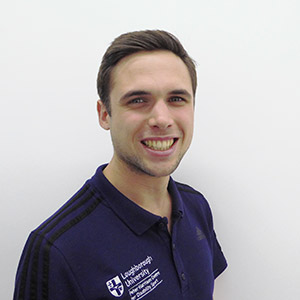Since finishing my PhD I have worked as a Research Associate within the same group that I completed my PhD. I have continued to work in the area of Ratings of Perceived Exertion, exercise intensity and spinal cord injury, whilst also expanding into the area of classification for para sport.
Working at the British Paralympic Association
As of January 2022 I will be starting a new role as Athlete Services Manager (Classification) at the British Paralympic Association, leading on the design and implementation of the BPA’s classification strategy moving towards Paris 2024 and beyond.
Without doubt, completing my research at Loughborough has prepared me for my new position. It allowed me to develop significant, specific, technical knowledge of the subject area that will be invaluable. Perhaps even more so however, are the contacts and network that researching at Loughborough has given me.
Loughborough offered an MSc in Exercise Physiology, the area in which I wanted to study and research. In the Peter Harrison Centre for Disability Sport, it also has a world-renowned research centre focusing on para sport. Loughborough University was the natural choice.
My research area
The title of my PhD was ‘The application of subjective ratings of perceived exertion to regulate exercise intensity during upper body exercise’. I conducted my PhD part-time alongside working as a Research Assistant and Lab Technician for the Peter Harrison Centre for Disability Sport.
Population-level exercise recommendations are relatively easy to define and monitor in terms of duration frequency, but far less so for intensity. This is especially the case for disabled adults, such as those with spinal cord injury (SCI), because of the physiological consequences of the injury.
The aim of my research was to be able to inform specific, evidence-based exercise intensity recommendations for people with SCI. This could benefit researchers designing experiments investigating exercise in SCI, as well as clinicians or practitioners working directly with adults with SCI in various rehabilitation, exercise or physical activity settings.
The things I most valued during my PhD were being part of a larger research group which provided a lot of peer support, in addition to that which I received from my supervisors. This was beneficial for my research, but also socially. I also got to travel to a number of international conferences which were great opportunities to communicate my research.
A sense of pride
Having completed my PhD, I would say that actually submitting it is possibly my best experience. Your viva day, even if successful, can be stressful, whilst graduation day is often more exciting for your family. The day I submitted though gave me a massive sense of pride in the work I had produced, as I stood there with my thesis in my hands. Finally submitting also means you get to enjoy some well-deserved down time before the viva prep starts.
Advice for applicants
The advice I would give to someone thinking of undertaking a PhD at Loughborough is to think about the topic area. You will be spending 3-4 years on this, so you have to find it interesting and to enjoy it. I think it also helps to have a clear understanding of “why” the research question needs answering, because it gives a sense of purpose to what you are doing.
Be prepared for things to change. Things don’t always go to plan, so you need to be able to adapt and learn. Finally, have a way (or ways!) of being able to switch off from your PhD. It is a long process and there can be difficult moments, so having complete breaks from thinking about it are absolutely necessary at points.
